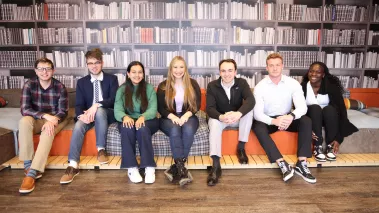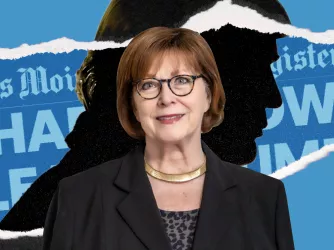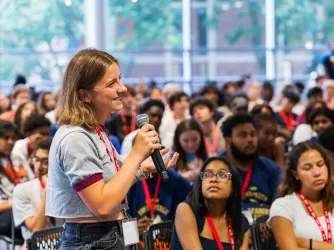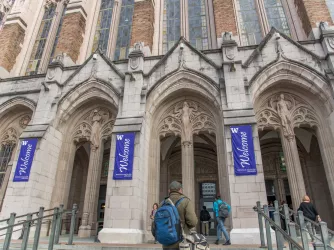Table of Contents
FIRE’s Campus Scholars bring free speech culture to campus

FIRE Campus Scholars (left to right): Logan Torres, Cole Daigneault, Grishma Baruah, Ashley Berdelis, Lincoln Anniballi, Hulan Edward, Nogaye Ndiaye
If you follow FIRE’s reporting, you already know college students and professors are targeted by censorial administrators at alarming rates just for speaking their minds. You’ve also likely noticed an even more concerning trend: censorship rising from the ground up, led by students who lobby administrators to silence unpopular opinions, refuse to recognize student groups, shout down invited speakers, and police professors’ teaching methods.
In this context, students who understand and can communicate the importance of free speech to administrators, professors, and — maybe most importantly — their peers are needed more than ever on American college campuses.
Enter: FIRE’s Campus Scholars.
Last year, we set out to empower the best and brightest student advocates for free speech by launching the Campus Scholars program. Through funding and guidance, the program brings various student-led projects to life at their schools. Our inaugural class did not disappoint. In the fall 2022 semester, they offered fresh perspectives to the conversation around expressive rights through creative initiatives including:
- An online publication exploring free speech and social progress.
- An art installation that invited community members to amplify each other’s voices.
- A podcast on free speech abroad.
While many of their projects continue, these students have passed the baton to the spring semester’s seven-member cohort. This semester’s scholars continue to revive free speech culture on campuses from coast to coast, implementing projects designed to, among other things, assess current attitudes toward expression, foster open debate, and bring historical context to modern issues.
We look forward to continuing to collaborate with this semester’s Campus Scholars, watching their projects progress, and celebrating their contributions to free speech culture on campus and beyond.
In January, they met with each other and FIRE staff members to refine their ideas. Here’s what they’re working on now:
Lincoln Anniballi, Hofstra University
Lincoln’s project will assess student attitudes toward free speech on campus, shedding light on the current state of the culture at Hofstra. So far, he has circulated a survey asking students their beliefs about free speech. Upon compiling the results, he will analyze how student views track with Hofstra’s existing speech policies. Then, Lincoln said, he “will create educational materials, like social media posts, flyers, and brochures, and host hands-on activities to teach students about their rights.”
Grishma Baruah, College of William & Mary
Grishma is bringing open discourse to campus by hosting monthly debates through the university’s debate society, of which she is vice president of education. Each debate is based on a specific individual right, such as due process or freedom of assembly, which she introduces to the debaters beforehand and ties in with current events. So far, she has held one debate on the compatibility of a liberal arts education with free speech. “William & Mary is a campus filled with diverse, curious perspectives,” said Grishma. “I want to use debate as a safe space for students to share their opinions and learn more from others.”
Ashley Berdelis, Texas Christian University
By publishing a weekly blog featuring interviews with TCU students and faculty, and supplementing it with survey data, Ashley aims to illuminate whether TCU classrooms facilitate free expression. “I will be polling students to see how comfortable they are using their voice in the classroom,” she said. To conclude her project, Ashley envisions sharing her findings with TCU’s administration and advocating for policies that create a culture where students are encouraged to speak their minds.
Cole Daigneault, University of Washington
Concerned that UW is the lowest ranked public institution in FIRE’s Free Speech Rankings, Cole partnered with other undergraduates to create Huskies for Liberty, a registered student organization dedicated to promoting free speech, individual rights, limited government, and consent on the UW campus and beyond. Already, HFL has attracted a wide range of students and held a major public meeting. Now, Cole plans to “bring a first-of-its-kind student-led free speech conference” to UW on April 28, he said. “Together, we will engage critically with the UW community to foster civil discourse and promote a more tolerant and open culture at our school.”
Hulan Edward, Oberlin College
“For my project,” said Hulan, “I’m building an ePortfolio and bringing in a guest speaker to help educate the campus community on the importance of actually practicing free speech, especially at a high caliber academic institution.” The ePortfolio website, launching in late April, will include five sections, each addressing a question like, “What is free speech?” and, “What are the dangers of revoking free speech?” It will also allow students and other community members to share their personal experiences on campus.
Nogaye Ndiaye, Syracuse University
Nogaye believes Syracuse students can have productive conversations about complex issues. To this end, she will lead a series of workshops — beginning after spring break — that challenge students to defend their perspectives or change their way of thinking based on what they learn from one another. “Through encouraging the audience to exercise their right to expression, regardless of their stance, I aim to moderate complex discussions that will help further the communication skills of students,” said Nogaye. She hopes students will leave the sessions with new knowledge on the topics at hand and with an understanding of the First Amendment rights that allow such discussions to flourish.
Logan Torres, Brown University
“At the roots of environmentalism lies free speech,” said Logan. “Since the 1970’s, activism within this community has been rooted in principles of civil disobedience.” Yet the connection between these two values often goes unrecognized. That’s why Logan is producing a podcast that examines the intersection of freedom of expression and the environmental movement. In doing so, he will record interviews with professors who offer different perspectives on the relationship between freedom of speech, the freedom to protest, and environmentalist advocacy. Afterward, he hopes to hold an on-campus event to showcase clips from the podcast and engage in a live panel discussion with interviewees.
At FIRE, we know from experience that colleges, despite often framing themselves as bastions of free expression, are not always so hospitable to it in practice. So we know that bringing these projects to fruition is no easy feat. That’s why we’re so inspired by these students’ efforts to keep the flame of free speech burning bright. We know their projects will benefit their campus communities and society at large, which will no doubt be improved by the presence of more college graduates who understand, respect, and speak up for expressive rights.
We look forward to continuing to collaborate with this semester’s Campus Scholars, watching their projects progress, and celebrating their contributions to free speech culture on campus and beyond.
Want to become a Campus Scholar? Learn more about the program here.
Recent Articles
FIRE’s award-winning Newsdesk covers the free speech news you need to stay informed.

FIRE’s defense of pollster J. Ann Selzer against Donald Trump’s lawsuit is First Amendment 101

China’s censorship goes global — from secret police stations to video games

High schoolers: Become a voice for tomorrow, today!


